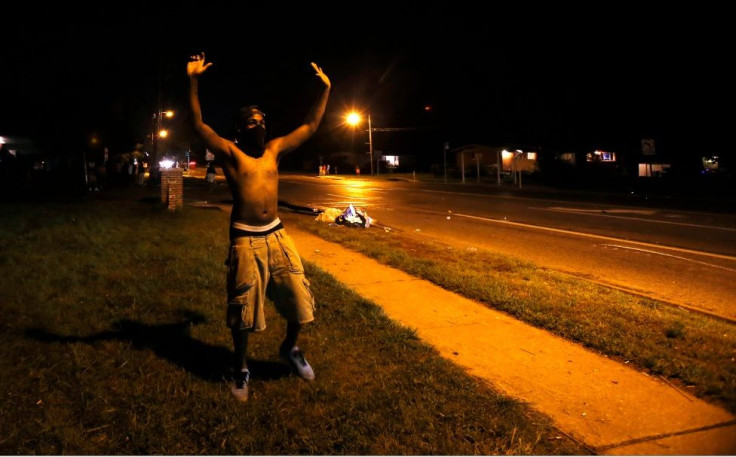Anonymous Twitter Suspended Amid St. Louis Police Hack; Other Anon Accounts Decry Naming Officer

The St. Louis County Police confirmed to multiple outlets Thursday that the department has been hit by a cyberattack, with the agency’s website and emails down since Wednesday. Word of the hack came at the same time Twitter suspended the account of the Anonymous hacker collective, who've been feuding with the police online over details withheld in the Mike Brown shooting.
The confirmation also comes after the Ferguson, Missouri, police reported their system was infiltrated, with Anonymous claiming responsibility for briefly rendering the department’s phones and computers useless.
St. Louis County Police tells NBC News they are under "some sort of cyber-attack" and that their e-mail has been down since last evening.
- Tom Winter (@Tom_Winter) August 14, 2014The cyberwarfare comes amid intense national focus on the death of Brown, an unarmed 18-year-old African American who, witnesses allege, was shot by white police officers who then left his corpse lying face down in broad daylight for hours. Missouri Governor Jay Nixon announced that the St. Louis County Police Department would be removed from the investigation, with peaceful protesters complaining that the heavily militarized police had been pointing weapons at civilians.
Few details were known about the St. Louis cyberattack, though the department’s official Twitter feed had traded barbs with @TheAnonMessage after the now-defunct feed claimed to identify the officer who killed Brown Saturday.
@TheAnonMessage We will not provide the involved officer's name or any further information. It is an ongoing investigation.
- St. Louis County PD (@stlcountypd) August 14, 2014The fallout in the wake of TheAnonMessage’s decision to publicize the officer’s name without any kind of due process is also a reminder that the loosely affiliated collective is just that: loosely affiliated. Tweets from @OpFerguson (each cause Anonymous involves itself with it designated its own Twitter feed, with @OpSteubenville a prominent past example) made it clear that not all of the hackers involved supported the decision to publicly identify someone.
The simple truth is, we'ld prefer NOT to have to release the name of Mike Brown's shooter. We would prefer the police do that. | #OpFerguson
— Operation Ferguson (@OpFerguson) August 14, 2014Since we began this Operation, this team has done everything in our power to act responsibly and sensibly. We will continue to do so.
— Operation Ferguson (@OpFerguson) August 14, 2014But for the record, one last time. Operation Ferguson has NOT, repeat NOT released the name of Mike Brown's killer. Nor have we claimed to.
— Operation Ferguson (@OpFerguson) August 14, 2014Gabriella Coleman, an anthropologist who studies the group and is the author of the upcoming book chronicling the history of Anonymous, told the New York Times that members of Anonymous were arguing about releasing the unverified information in chat rooms.
“My jaw was dropping,” she said. “I was surprised because what I was seeing was suggestive but not definitive. Anonymous tends to care about its image quite a bit, and if they were wrong, it would be really bad.”
© Copyright IBTimes 2024. All rights reserved.



















